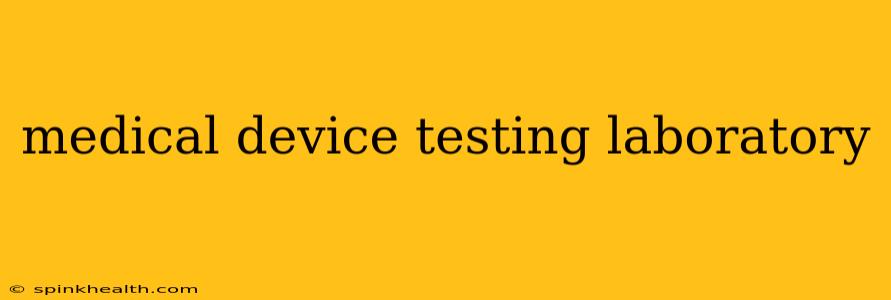The world of medical devices is a complex one, demanding rigorous testing and validation to ensure patient safety and efficacy. At the heart of this process lies the medical device testing laboratory – a critical link in bringing life-saving innovations to market. But finding the right lab, understanding their services, and navigating the regulatory landscape can feel like traversing a maze. This comprehensive guide will illuminate the path, answering key questions and demystifying the process.
What is a Medical Device Testing Laboratory?
Imagine a meticulous detective, meticulously examining every facet of a medical device. That's essentially the role of a medical device testing laboratory. These specialized facilities conduct a wide array of tests to ensure that devices meet stringent safety, performance, and regulatory requirements before they can be marketed and sold. From simple visual inspections to complex biocompatibility studies, these labs are crucial gatekeepers ensuring patient well-being. They are equipped with sophisticated instruments and staffed by highly trained scientists and engineers who understand the intricacies of medical device regulations and testing protocols. Their work contributes directly to patient safety, a responsibility they take incredibly seriously.
What Types of Tests Do Medical Device Testing Labs Perform?
The breadth of testing conducted by medical device testing labs is vast and depends heavily on the specific device. Some common tests include:
- Biocompatibility Testing: This examines the device's interaction with biological systems, ensuring it doesn't cause adverse reactions in the body.
- Mechanical Testing: This evaluates the device's strength, durability, and resistance to wear and tear under various conditions.
- Electrical Testing: This assesses the safety of electrical components, ensuring they meet safety standards and don't pose a risk of electric shock.
- Sterility Testing: This verifies that the device is free from harmful microorganisms.
- Performance Testing: This evaluates the device's ability to function as intended, accurately measuring its effectiveness.
- Packaging and Labeling Testing: This ensures that the packaging protects the device and that the labeling accurately communicates the necessary information.
How Do I Choose the Right Medical Device Testing Laboratory?
Selecting the right lab is crucial. Several factors must be considered:
- Accreditation and Certifications: Look for labs accredited by recognized bodies like ISO 17025, ensuring their adherence to international quality standards.
- Expertise and Experience: Choose a lab with specific experience in your device type and the relevant testing standards.
- Turnaround Time: Consider the lab's turnaround time for test results, factoring in your project timelines.
- Cost: Obtain detailed quotes from several labs to compare pricing and services.
- Location and Communication: Consider geographical proximity and the lab's communication protocols for easy collaboration.
What are the Regulatory Requirements for Medical Device Testing?
Navigating the regulatory landscape is vital. Requirements vary depending on the device's classification and intended use, but key considerations include:
- FDA Regulations (USA): The Food and Drug Administration (FDA) has stringent regulations for medical devices, outlining specific testing requirements.
- CE Marking (Europe): The CE mark indicates conformity with European Union health, safety, and environmental protection legislation.
- Other International Regulations: Regulations vary across different countries, necessitating careful consideration of the target market.
How Much Does Medical Device Testing Cost?
The cost of medical device testing can vary widely depending on the complexity of the device, the number of tests required, and the lab's pricing structure. It's best to contact multiple labs for customized quotes tailored to your specific needs.
What are the Common Challenges in Medical Device Testing?
While essential, medical device testing faces challenges:
- Stringent Regulations: Meeting ever-evolving regulatory requirements can be complex and time-consuming.
- Testing Complexity: The complexity of modern medical devices makes thorough testing a significant undertaking.
- Cost and Time Constraints: Balancing the need for comprehensive testing with budget and time constraints is always a challenge.
Choosing the right medical device testing laboratory is an investment in safety and success. By carefully considering the factors outlined above, medical device companies can ensure their products meet stringent standards and contribute to better patient outcomes. The journey might be complex, but with thorough planning and the right partner, navigating the maze becomes significantly easier.

